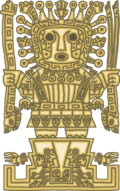Sapa Inka: Difference between revisions
mNo edit summary |
No edit summary |
||
| Line 16: | Line 16: | ||
| style = Great and Only One (formal) <br> or <br> His Majesty (diplomatic relations) | | style = Great and Only One (formal) <br> or <br> His Majesty (diplomatic relations) | ||
}} | }} | ||
The '''Sapa Inka''' (also known as the ''Emperor of Kayahallpa'' in {{wp|English|Anglic}}) is the monarchial {{wp|head of state}} and {{wp|head of government}} of [[Kayahallpa]] who holds absolute power. He is the head of the Kayahallpan royal family, the [[Qhapaq | The '''Sapa Inka''' (also known as the ''Emperor of Kayahallpa'' in {{wp|English|Anglic}}) is the monarchial {{wp|head of state}} and {{wp|head of government}} of [[Kayahallpa]] who holds absolute power. He is the head of the Kayahallpan royal family, the [[Qhapaq Dynasty]]. The current Sapa Inka is [[Tupaq Yupanki III]], reigning since 1959, the longest in Kayahallpan history. The position of Sapa Inka has always been held by a man, though some close advisors have been female, and the Sapa Inka's wives have often exerted a great influence over politics. | ||
===History=== | ===History=== | ||
The modern line originated from {{wp|Quechua people|Runakuna}} tribal chiefs sometime in the 12th century in the hinterlands of the [[Kayamuca Empire]] before they migrated to Kayahallpa (then called ''Wari'') in the early 1300s. They established the [[Runakuna Kingdom]] in Q'umir Suyu near north-eastern Wari in 1365. The [[ In 1434 they seized Tupawasi, the greatest of the Warian cities, and proclaimed the ''Musuq Kayamucha'' ("New Kayamuca") and soon controlled a massive empire covering the modern boundaries of Kayahallpa. | The modern line originated from {{wp|Quechua people|Runakuna}} tribal chiefs sometime in the 12th century in the hinterlands of the [[Kayamuca Empire]] before they migrated to Kayahallpa (then called ''Wari'') in the early 1300s. They established the [[Runakuna Kingdom]] in Q'umir Suyu near north-eastern Wari in 1365. The [[ In 1434 they seized Tupawasi, the greatest of the Warian cities, and proclaimed the ''Musuq Kayamucha'' ("New Kayamuca") and soon controlled a massive empire covering the modern boundaries of Kayahallpa. | ||
Revision as of 07:54, 17 October 2021
| Sapa Inka of Kayahallpa | |
|---|---|
| Sapan Inka Musuq Kayamuchapa | |
 | |
| Incumbent | |
| Tupaq Yupanki III since 27 April 1959 | |
| Details | |
| Style | Great and Only One (formal) or His Majesty (diplomatic relations) |
| Heir apparent | Unknown |
| First monarch | Nyawpa |
| Formation | 1365 CE |
| Residence | Apuwasi Palace |
The Sapa Inka (also known as the Emperor of Kayahallpa in Anglic) is the monarchial head of state and head of government of Kayahallpa who holds absolute power. He is the head of the Kayahallpan royal family, the Qhapaq Dynasty. The current Sapa Inka is Tupaq Yupanki III, reigning since 1959, the longest in Kayahallpan history. The position of Sapa Inka has always been held by a man, though some close advisors have been female, and the Sapa Inka's wives have often exerted a great influence over politics.
History
The modern line originated from Runakuna tribal chiefs sometime in the 12th century in the hinterlands of the Kayamuca Empire before they migrated to Kayahallpa (then called Wari) in the early 1300s. They established the Runakuna Kingdom in Q'umir Suyu near north-eastern Wari in 1365. The [[ In 1434 they seized Tupawasi, the greatest of the Warian cities, and proclaimed the Musuq Kayamucha ("New Kayamuca") and soon controlled a massive empire covering the modern boundaries of Kayahallpa.